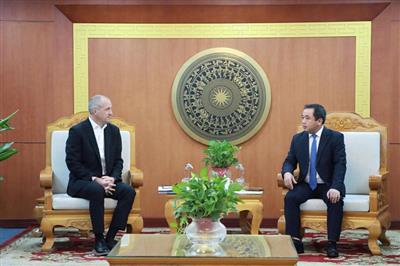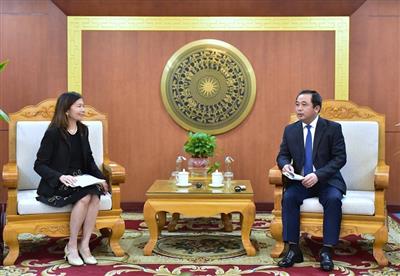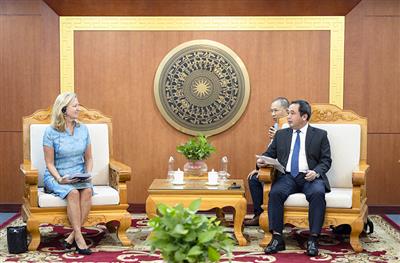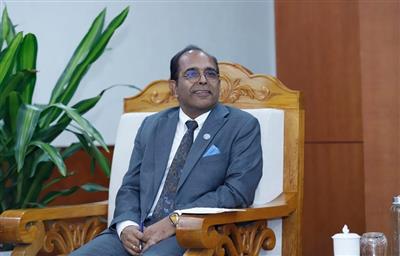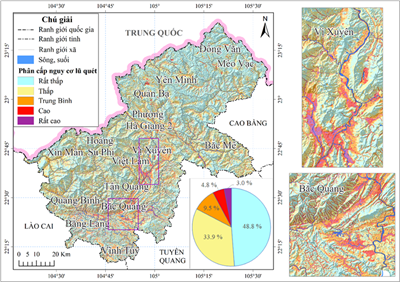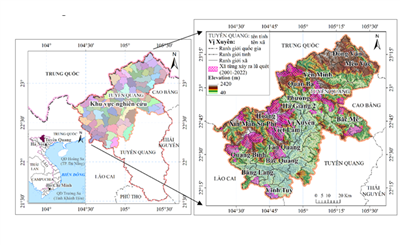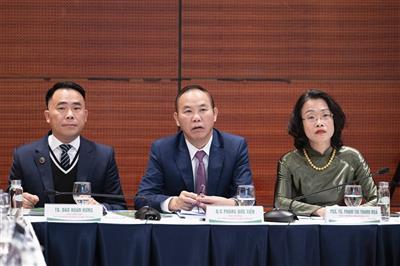
Bac Ninh 2025 conference: Driving science, innovation and digital transformation in agriculture and the environment
11/05/2025TN&MTOn May 10, 2025, in Bac Ninh province, the Ministry of Agriculture and Environment, in collaboration with the provincial People's Committee, organized a conference to implement the "Plan for the Implementation of Resolution No. 57-NQ/TW of the Politburo on breakthroughs in the development of science, technology, innovation, and national digital transformation" in the fields of agriculture and environment. The event attracted the participation of leaders from ministries, sectors, localities, experts, scientists, businesses, cooperatives, and international organizations.
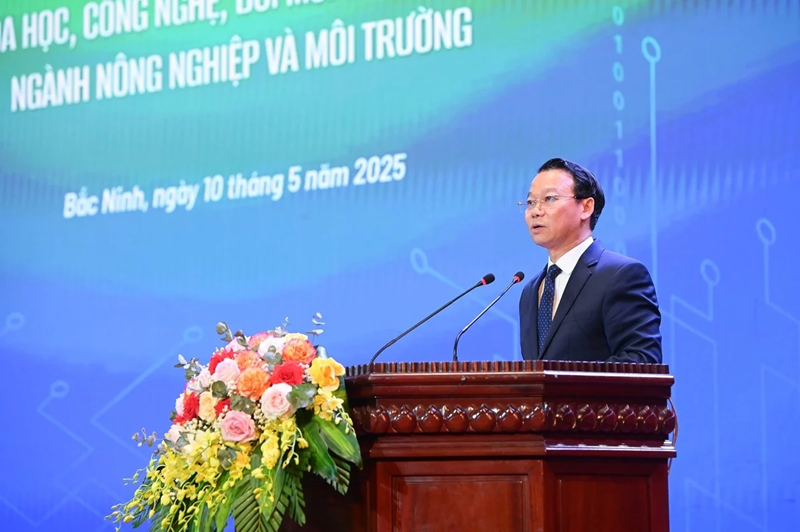
Minister Do Duc Duy delivering the opening speech at the conference on implementing the "Plan to carry out Resolution No. 57-NQ/TW of the Politburo on breakthrough development in science, technology, innovation, and national digital transformation in the agriculture and environment sectors."
Delivering the opening speech, Minister of Agriculture and Environment Do Duc Duy emphasized that the presence of senior leaders from central and local agencies, experts, scientists, businesses, cooperatives, international organizations and the press underscored a strong shared commitment to accompany the sector as it enters a new stage of development driven by science, technology and digital transformation.
A pivotal moment for strategic breakthroughs
The year 2024 marks a pivotal transition period for the agriculture and environment sectors in Vietnam, as the country embarks on the implementation of Resolution No. 57-NQ/TW of the Politburo. This resolution lays out the strategic orientation for science, technology, and innovation development through 2030, with a vision to 2045. For the Ministry of Agriculture and Environment, this is not only a political task but also an opportunity to fundamentally reshape the sector’s development model.
According to Minister Do Duc Duy, Resolution 57—issued by the Politburo on December 22, 2024—defines a national vision that places science, technology, innovation, and digital transformation not only as pillars of sustainable development, but as the best opportunity for Vietnam to rise as a powerful and prosperous nation in the modern era.
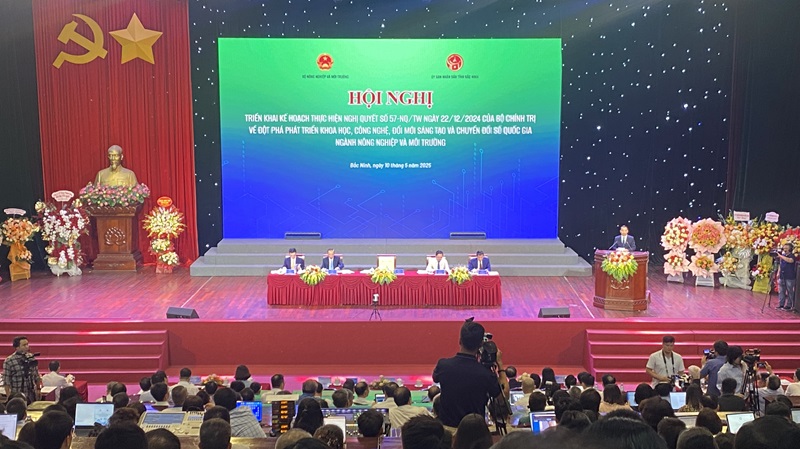
The conference focused on thoroughly communicating and deploying seven key tasks and solutions, as outlined in Decision No. 503/QĐ-BNNMT dated March 27, 2025 by the Ministry of Agriculture and Environment
Over the past decades, science and technology have made notable contributions to agricultural productivity, food security, and poverty reduction. However, as global challenges grow more complex—ranging from climate change, land degradation, water scarcity to biodiversity loss—Vietnam’s traditional growth models are reaching their limits. Without innovation and digital transformation, the sector will struggle to meet rising domestic demands and international sustainability standards.
Traditional models of labor-intensive, low-value farming are increasingly obsolete. Meanwhile, trends such as circular agriculture, multi-value agriculture, green transformation and digitalization are becoming imperative.
“To shift the paradigm, we must fundamentally change our mindset and approach. Science, technology and digital transformation must be our foundation,” the Minister asserted.
At this juncture, the Ministry of Agriculture and Environment is determined to shift from awareness to action, from fragmented projects to unified strategies, and from incremental change to breakthrough innovation. The goal is clear: to build a smart, green, and resilient agriculture and environmental sector that actively contributes to Vietnam’s sustainable development goals.
Progress made, but more work ahead
In recent years, the Ministry of Agriculture and Environment has taken a proactive approach in proposing, formulating, and implementing key policies to promote the development of science, technology, and innovation in the sector. Many national and ministerial-level research programs have been carried out effectively, closely aligned with the realities of production and management. Several research outcomes have been successfully applied, contributing to improved productivity and quality in agriculture, better disaster prevention and climate change adaptation, as well as more sustainable natural resource management.
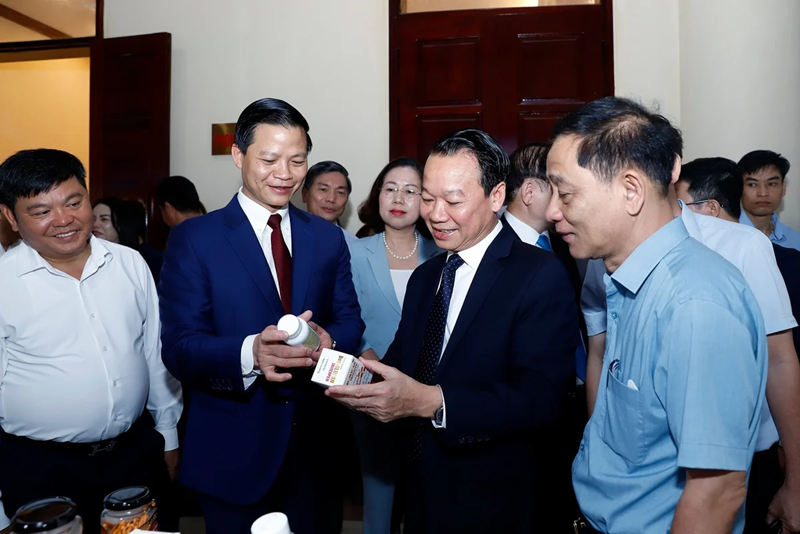
During the conference, Minister Do Duc Duy visiting the exhibition showcasing some research, transfer, and application achievements in science and technology in agriculture and the environment, set up right outside the main hall
Still, these advances fall short of the breakthrough expectations set out in Resolution 57. The science and technology system within the agriculture and environment sectors still faces numerous challenges. The policy framework for scientific research, technology transfer, and innovation lacks consistency and breakthrough incentives. Business investment in research and development remains very limited. While the scientific workforce is capable and dedicated, there is a shortage in numbers, and conditions for work and professional growth are still constrained. The linkage between research institutes, universities, businesses, and state management agencies remains weak, and public-private partnerships in research and technology transfer are underdeveloped.
Moreover, the level of science and technology application in agricultural production, environmental protection, and resource management remains low in many localities. Implementation is often limited to pilot models, lacking mechanisms for large-scale replication. Digital transformation—a key pillar of innovation—has made initial progress but remains fragmented. Data integration is insufficient, shared platforms are lacking, and a comprehensive digital ecosystem to support the sector has yet to take shape.
This reality underscores the need for a new and bold approach to ensure science, technology, and innovation truly become the driving force for development in agriculture and environment. Such an approach must include strategic thinking, innovative policy design, and effective implementation—across central and local levels, from institutions to human capital, and from public investment to mobilizing social resources.
The conference focused on thoroughly communicating and deploying seven key tasks and solutions, as outlined in Decision No. 503/QĐ-BNNMT dated March 27, 2025 by the Ministry of Agriculture and Environment. In addition, delegates discussed priority solutions to catalyze the application of science, technology, and digital transformation into real-world practices.
Five strategic breakthrough directions
To ensure practical results, Minister Do Duc Duy proposed five priority directions where science, technology, and digital transformation must serve as the driving force behind comprehensive change.
First, prioritize the development of science and technology as a core driver of productivity, quality, efficiency, and competitiveness in agriculture and environmental management.
Second, implement digital transformation throughout the value chain: from planning, production and processing to distribution and traceability, with a focus on platforms like the national agricultural database and digital maps of land, forests, and biodiversity.
Third, promote green growth, circular economy, and climate-resilient development models that combine indigenous knowledge with modern science and technology.
Fourth, accelerate innovation in institutions and policies to eliminate barriers, encourage creative initiatives, and foster public-private partnerships in science and technology investment.
Fifth, reform education and training to create a highly skilled workforce equipped to lead the transformation of agriculture and environment in the digital age.
From awareness to action
The issuance of Resolution No. 57-NQ/TW by the Politburo marks a strategic turning point, signaling a profound shift in development thinking: science, technology, and innovation are to be the core drivers of agricultural and rural development, as well as environmental protection. This move affirms and concretizes the Party’s major orientations toward rapid and sustainable development, climate adaptation, and alignment with digital transformation and the circular economy.
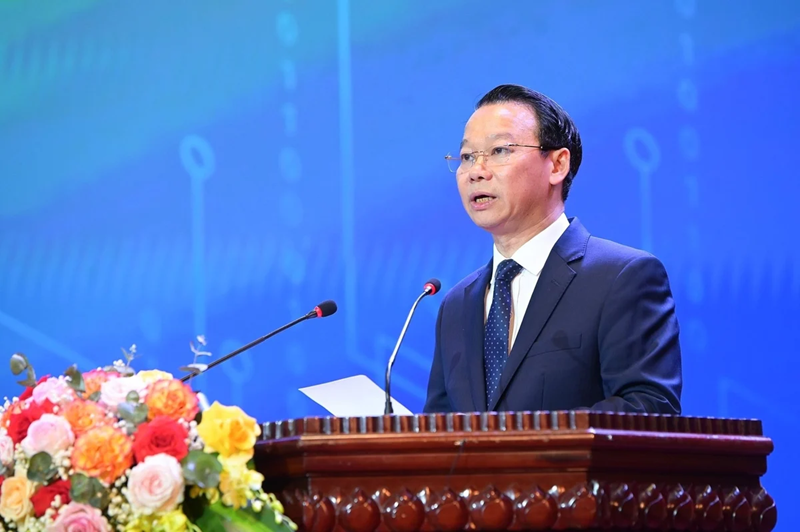
In this conference, Minister Do Duc Duy hopes to be the positive starting point, driving the process of translating the major directions of Resolution 57-NQ/TW into practical actions in the Agriculture and Environment sectors
Yet correct awareness alone is not enough. What matters more is the effective implementation of the goals and tasks set out in the Resolution. In this context, the Conference to implement the Action Plan for Resolution No. 57-NQ/TW represents a crucial first step—setting the direction and laying the foundation for a long-term, systematic course of action spanning from central to local levels, from institutional reforms to human capacity development, and from technological upgrades to a shift in development mindset.
Transforming awareness into concrete action requires strong political commitment, close coordination across sectors and levels, and genuine participation from businesses, research institutes, universities, and the public. Crucially, this transformation must be backed by robust investment and flexible, enabling policies that can unlock existing bottlenecks while fostering an ecosystem conducive to innovation and growth.
Concluding the Conference on the Implementation Plan for Resolution No. 57-NQ/TW, Minister Do Duc Duy emphasized the pivotal role of science, technology, innovation, and digital transformation in realizing strategic breakthroughs in agriculture, rural development, and environmental protection. According to the Minister, this is not only a pressing demand of the times but also an essential path toward rapid, sustainable development and enhanced national competitiveness.
On behalf of the sector, the Minister called on the entire political system, ministries, localities, enterprises, cooperatives, and communities to seize this opportunity and swiftly move from awareness to concrete action. Each agency, unit, and locality should translate the tasks of the Plan into specific programs, schemes, and projects tailored to their local contexts, while actively embracing innovative thinking, fostering stronger linkages, and leveraging internal strengths.
To successfully implement Resolution No. 57-NQ/TW, Vietnam must build an open and effective innovation ecosystem—one where scientists, businesses, and farmers work together to create a green, smart, and sustainable future for agriculture and the environment.
Ngoc Huyen


